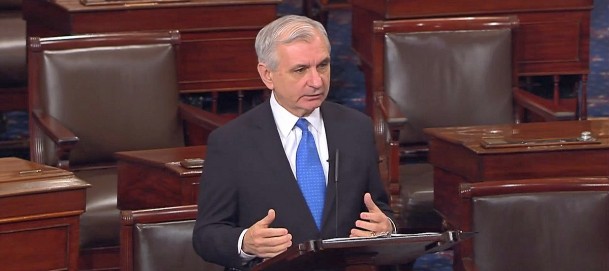
Reed Backs Trump Administration Decision to Extend Immigration Status for Liberians
Senator Reed’s advocacy results in one-year extension of Deferred Enforced Departure to allow Liberians to remain in their U.S. communities
WASHINGTON, DC – U.S. Senator Jack Reed (D-RI) today backed the Trump Administration’s decision to extend Deferred Enforced Departure (DED) for qualified people from Liberia for one year, through March 31, 2020, and is calling for Congress to enact a more permanent legislative resolution.
Senator Reed is the author of S. 456, the Liberian Refugee Immigration Fairness Act, to end the perpetual limbo for Liberians here in the United States and ensure our national security interest in fostering Liberia’s recovery. This bill provides legal status and a pathway to citizenship for qualifying Liberians. He also led the effort in Congress to urge the Trump Administration to take action and extend protected status for Liberians.
The West African nation of Liberia, which was founded in 1822 by freed slaves from the United States, was plagued by two brutal civil wars in the 1990s and more recently by a major Ebola outbreak. As part of its humanitarian response, the United States offered certain Liberians an opportunity to live, work, and pay taxes in the United States under the Temporary Protected Status (TPS) and Deferred Enforced Departure (DED) systems, extended by both Republican and Democratic administrations beginning in 1991.
However, last year, President Trump announced that DED for Liberian beneficiaries would expire on March 31, 2019.
Trump’s announcement today means Liberians who have been legally living in the United States may stay another 12 months without threat of deportation, bringing a protracted effort by Senator Reed to secure the extension to a positive conclusion. If President Trump had not approved the DED extension, many Liberians could have been at risk of deportation starting Sunday, March 31.
Many of the Liberians living in the United States who received this DED extension fled Liberia when it was engulfed in two bloody civil wars from 1989 to 1997 and 1999 to 2003 that killed hundreds of thousands of people and displaced more than half of the population. Since then, many Liberians built new lives in Rhode Island – having children, starting businesses, buying homes, and paying U.S. taxes. The Ocean State is home to one of the largest Liberian populations per capita in the United States.
“On a divisive issue like immigration, I appreciate this a positive step by President Trump. It’s good news for eligible Liberians, for Rhode Island, and our workforce. But it is only temporary relief when what we real need is a permanent fix that puts these law-abiding taxpayers on a path to full citizenship,” said Senator Reed. “Separating and uprooting hundreds of Liberian-American families from their jobs and homes and forcing them to return to a country that is unrecognizable for many of them would not have been in America’s best interests. In the long-term, we still need a solution that provides certainty for this population, allowing them to get on a pathway to full citizenship. It is time for Congress to act on legislation that gives Liberians an opportunity to remain here permanently.”
Rhode Island has one of the largest populations of Liberians per capita, and Senator Reed has been working since 1999 to allow this community to legally remain in the United States. Many members of the Liberian community in the United States financially assist families and communities back in Liberia and make important contributions to Liberia’s reform and development. Liberia’s nascent recovery efforts could be reversed if these remittances end, harming the United States’ foreign policy interests in the region.

